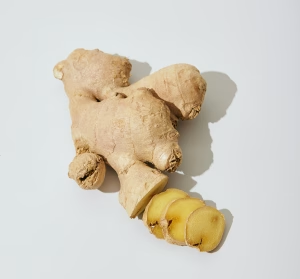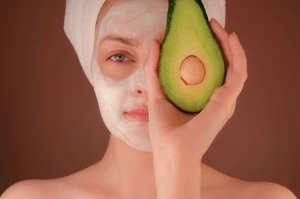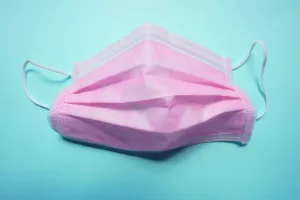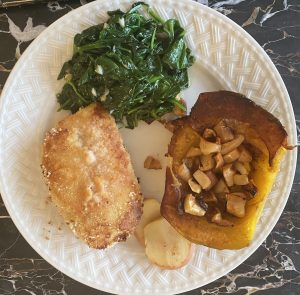Immune System
Black Friday & Raw Ginger

Friendly reminders for the next cold month of holiday season: To ward off cold weather most of the body’s excitatory and invigorating substances rush to the surface, thereby leaving our metabolic and endocrinological layer more vulnerable to cold and/or hypo-functionality. This can be the case even in places like Los Angeles, where the climate is relatively colder than what its inhabitants are used to.
A daily cup of ginger can warm our “more internal parts,” as to do with organs and hormones. I would recommend 3 slices, as depicted here, simmered in 3-4 cups of water for 30-40 minutes. If you’re dealing with sinus and/or respiratory issues you can use 4-5 slices, which changes the chemistry of the ginger to act more upon the lungs. If your physiological pattern includes “blood deficiency,” it is advisable to combine with a teaspoon or tablespoon of honey, or a few red dates, so as to not aggravate dryness.
Little known facts about raw ginger:
- can raise blood pressure and heart rate
- Increases stomach motility and acid secretion
- Evidenced to have an antibiotic effect against Salmonella typhi (Typhoid fever), Vibrio cholerae (Cholera), and Trichomanas vaginalis (an STD). Obviously, consult your physician. If used in such cases it should be within the context of a greater, targeted, customized formula
Second and final reminder: BLACK FRIDAY!
$50 OFF all follow up sessions and $100 off initial visits between now and New Year’s. Exclusions include those with 10 discounted session packages, those receiving superbills, and of course insurance patients.
Chinese Medical Dermatology
 November is skin care awareness month, and although it is not a subject I discuss often in my blog or instagram, dermatology makes up a huge part of Chinese medical literature. As always, I hope and believe people will consider us to treat the actual root (not “the root” that certain pharmaceuticals’ TV ads claim to) of any skin issues that might befall them.
November is skin care awareness month, and although it is not a subject I discuss often in my blog or instagram, dermatology makes up a huge part of Chinese medical literature. As always, I hope and believe people will consider us to treat the actual root (not “the root” that certain pharmaceuticals’ TV ads claim to) of any skin issues that might befall them.
The first time my daughter had Covid she recovered quickly, as most babies and toddlers do, but it left her with some atopic skin issue on her face. We applied some topical creams that had been helpful with issues in the past, but to no avail. I consulted a teacher of mine, who recommended a formula we don’t generally think of for dermatology. It would be more categorized—that is oversimplified—as an immunological treatment, containing all the usual suspects for an exterior virus: Ephedra, ginger, wild ginger, cinnamon branch, etc.
My apologies for the cliche, magical resolution anecdote, but it does happen and did so here, probably and partially because of how young and fundamentally healthy she is. Her skin cleared up within 24 hours, to never return. We didn’t even finish the recommended dosages.
In Chinese medicine the liver is said to connect to our tendons, the stomach to our muscles (which is why proper diet can potentiate strength training), kidneys to the bones, and lungs to the skin. One way or another, most skin issues can be traced back to either our lungs, or their “paired organ,” the large intestine. In the case of my daughter, it was obviously the former.
There are 2 fundamental reasons why our skin erupts. Either inflammation trapped somewhere in the body is seeking an escape route, or a lack of blood and vital substances in the body are failing to reach the surface to lubricate and/or nourish our proverbial “exterior.” To assign the same prescription to both patterns based on a biomedical label would be ludicrous.
Cases of the former generally present as hot, red, itchy, and angry, whereas the latter are paler in color, dryer in texture, and more troubling cosmetically than anything else. Nevertheless, cosmetics matter. We’re all entitled to nice skin—more importantly to the quality and quantity of blood that belies it.
Hot and red, itchy skin generally benefits from a (closer to) vegan diet, plus bitter and anti-inflammatory herbs and foods, such as dandelion greens, kale, green tea, and a hiatus from alcohol. Acupuncture points are used to clear heat and fluid retention. We might also bleed particular vessels near the sites of eruptions to help move stagnant blood perpetuating the vicious cycle. Herbal medicines might revolve around gardenia fruit and scutellaria bark.
Pale, dry skin earns the opposite recommendation: Meat, beef, and more meat, bone broth, eggs, and plenty of sleep to help restore and regenerate blood. Black tea instead of green tea, the latter of which might further weaken the stomach with its bitterness; and moxibustion more than acupuncture to help warm and strengthen the organs. Herbal medicines likely revolve more around angelica and peony root, both of which can also be instrumental in reducing menstrual cramps. In both patterns, abstinence from dairy is advisable.
Finally, and as always, important to get your annual skin cancer scans with your dermatologist to rule out anything that is better taken care of with modern technology.
Climate Control for Couples

As a Chinese medicine clinician and a married man, it is always fascinating to me how often opposites attract, not just in terms of psyche or personality, but also physiological proclivities, “constitutions,” as we say.
Besides being the more extroverted or chaotic of the couple, my systemic pathologies tend more to heat patterns—that is excitatory and inflamed, while my wife’s tends more cold—inhibitory, lethargic, or vasoconstrictive. On our good days, as is the case with most couples, this nicely balances the division of labor in their complementing one another. On our bad days, as is the case with most couples… well, they’re bad days.
I half-joke that my wife really should live somewhere in southern California, as she tends to have a very slim sweet spot of tolerance for climactic fluctuations. Too hot or too cold and she’s aggravated, which in turn may or may not inevitably aggravate all present parties. I regularly and fully joke to her that never before I met her had I heard so many reports or internal debate around what to set the temperature at.
Based on dialogue with friends and patients, this is a common problem. One partner is forced to layer up in response to the other’s intolerance for heat or humidity—conversely one is forced to walk around naked with a fan on them in response to the other’s intolerance for cold.
From a Chinese medical perspective—you guessed it—the latter is preferable. Cold is organic, sure, the change of seasons is logical with the laws of nature, however it slows (blood) and contracts (tendons and muscles). Air conditioning should be kept to a moderate level, and the partner less tolerant of heat should limit their clothing, have a fan blowing (indirectly) around them, and sip cool peppermint, watermelon, or chrysanthemum tea to mitigate the climate.
Theoretically, in the long run, this will benefit them, as some mild perspiration may rid some of the fluids trapped at their muscle layer perpetuating their intolerance to humidity. Indoor temperatures can be lowered in the evening when it is organic for our internal temperature to come down.
This doesn’t mean to blast the heat with reckless abandon throughout winter, which would make all of us homeowners completely incapable of affording acupuncture or herbs. While we should protect ourselves from the external conditions, it should be to a moderate degree—one that protects, but doesn’t shelter us, so to speak, so our immunological substances remain primed and prepared to encounter whatever they should during our time outdoors.
As a friendly and annoying reminder, please do not use ice on your aches, pains, and injuries beyond the initially inflammatory 24-hour period. Dr. Gabe Mirkin, the doctor who wrote the R.I.C.E. protocol in 1978, has since written a public article rescinding his previous advice, inadvertently but not explicitly in accord with Chinese medical thought.
Boosting Immunity for This Covid Wave

It’s that time again, everyone: Covid Wave! In fact, I believe I’m late to the party, as this seems to have been going around for the past month now, thereby underscoring once again one of the many differences between Covid and the flu, as I have no recollection of any flu waves between July and August.
From a CM perspective, I suspect the incredible heat and humidity of July likely played a part in this, as coronavirus thrives in damper environments—recall in 2020 overweight men with pre-existing pulmonary issues were some of the most vulnerable candidates.
In light of the recent wave, I’ve had many people ask me what they can do to boost or juice their immune system, to which my first and foremost answer is one people don’t want to hear: Eat and sleep healthy.
“No, you idiot! I’m looking for a supplement. What can I take?”
Fair enough, but truthfully, I don’t believe there is anything better for immune support than regular moderate exercise, early bedtimes, adequate sleep, and three cooked meals a day with plenty of vegetables and some animal protein. Not to mention that from our perspective, the best thing you can take to boost immune function, or any bodily function, is an individualized, holistic formula, tailor-written to your pattern. Anything less will be precisely that, and if carelessly prescribed or taken in excess, can potentially cause subtle harm. With that said, there are empirical things we can do or take heading into cold and flu season seemingly a bit early this year.
- Regular acupuncture, or moxibustion treatments on the upper back, over the lungs, has been extensively studied and proven to boost immune function: https://www.frontiersin.org/journals/integrative-neuroscience/articles/10.3389/fnint.2019.00048/full
- A good multi-vitamin I think is advisable for all of us.
- Zinc is fine to take in intermittent cycles, but too much of it can cause stomach upset, as zinc has cold properties, which is why it can be useful for heat in the throat and lungs.
- Vitamin D can also be beneficial, but I recommend getting your levels tested before mindlessly supplementing.
- Mushrooms are also fine in intermittent cycles, however mushrooms are inherently damp, so should be taken cautiously by people with weight problems, over-sized tongues, or thick coatings on their tongues. For these I recommend Paul Stamets brand: https://fungi.com/collections/host-defense. For all other supplements I recommend Pure Encapsulations or Thorne.
As always, if you get Covid please call for a virtual herbal consultation, as I have no idea how anyone gets a full resolution from this pathogen without Chinese herbs. In my observation there have been many people who think they got a full resolution, but quite apparently did not based on their symptoms. Chinese medicine is the only medicine with the concept and diagnosis of “unresolved exterior pathogen,” and subsequently with the treatment principle of “releasing the exterior,” in reference to venting a virus to actual completion. If you choose not to take Chinese herbs, at least rest and recover, eat well, and do not exercise while sick.
How to Design Meals like Medicinal Formulas
 If food is medicine then creating each meal should be a bit like writing your own herbal formula. Whenever possible, it should be as agreeable as possible with our unique physiology, though this is admittedly challenging when cooking for a family where everyone has different body types. Nevertheless, one part of each meal should complement the other parts, either through synergistic benefit or offsetting its potentially detrimental qualities.
If food is medicine then creating each meal should be a bit like writing your own herbal formula. Whenever possible, it should be as agreeable as possible with our unique physiology, though this is admittedly challenging when cooking for a family where everyone has different body types. Nevertheless, one part of each meal should complement the other parts, either through synergistic benefit or offsetting its potentially detrimental qualities.
As a longstanding, traditional example, any time we get Thai or Mexican food, it is served with cucumber or radishes, respectively, which are there to mitigate the side effects of the spice.
Most foods are good, but almost all of them have “side effects.” Red meat nourishes the body’s blood, yin, and qi, but if it were an herb it would be a bit warm and damp. Too much red meat and/or red meat that is not harmonized by the remainder of the meal can create damp heat, or inflammation in the stomach and intestines. Then again too little red meat can cause a deficiency of blood, yin, and qi. Ideally red meat (and pork) would be consumed alongside steamed vegetables, then followed by hot green tea, either after the meal or the following morning (green tea at other times and/or for vegetarians is thought to have a bit too cooling, or vasoconstrictive effect on the microbiome—for them black teas are preferable).
Carbohydrates are settling for both the stomach and the mind—probably why they give us such immediately pleasure—but they are obviously stickier foods, “damper” foods, which are more difficult to digest. For this reason whenever possible, it is best to eat them warm and cooked, and alongside more acrid spices in the meal, such as basil, rosemary, ginger, garlic, or onion. While I am Jewish and from New York, and love a great tuna on a bagel, there is a remarkable difference in the physiological response to cold tuna on bread versus cooked pasta with garlic and oil, maybe vegetables and cannelini beans. Yum!
Salads. Oh boy, do westerners love salad. Frankly, if you tend to any digestive problems whatsoever, raw foods should be avoided as much as possible, but if you must:
Consume salad more in summer—less in winter—and always alongside some cooked protein and/or ginger tea. The acridity of the ginger should help to warm the stomach to digest the raw foods. The protein should provide warmth, plus some much needed calories, or “qi and yin.”
Cooked vegetables, allergies notwithstanding, are probably the only perfect food that wholly lack side effects, which is probably why they are also the one food that nearly every paradigm of medicine agrees upon. If you don’t consume cooked vegetables daily you are on a dangerous path, in my opinion. They are nearly always harmless and beneficial… yet still ultimately inadequate, as we can only imagine the metabolic fatigue and inevitable illnesses to come were someone to consume exclusively vegetables.
Food is a gentle medicinal. It will neither heal nor destroy us quickly on its own, however it will always do one or the other over time. I’ve seen firsthand, in myself, loved ones, and patients eradicate chronic symptoms by pursuing a more Eastern diet, though it took many months—in my case years! People should not get discouraged by eating well for a particular interim and not feeling dramatically better. Instead, pay attention to whether you feel worse (always a possibility), meanwhile recognizing that without internal medicine, diet alone may take a long time to cure disease. It is up to us to continue to better understand the nature of each food, so that we can wisely design the perfect “herbal formula” three times a day until the end of time.
Pictured above is an imperfect, but still great meal: Breaded chicken cutlet, sauteed spinach, and roasted acorn squash with roasted apples, cinnamon, and maple syrup. What is “imperfect” about it? First, fruit should be consumed at least 15 minutes apart from other foods so as to avoid creating its notoriously mucus-like congestion in the microbiome. Also, “natural” or not, let’s be honest: maple syrup is sugar; and chicken is healthier without breadcrumbs. On the other hand, breadcrumbs make up a very small amount of the meal, the apples are at least cooked, hence easier to digest, and the leafy greens with garlic should help to optimally process the meat and sugars.

